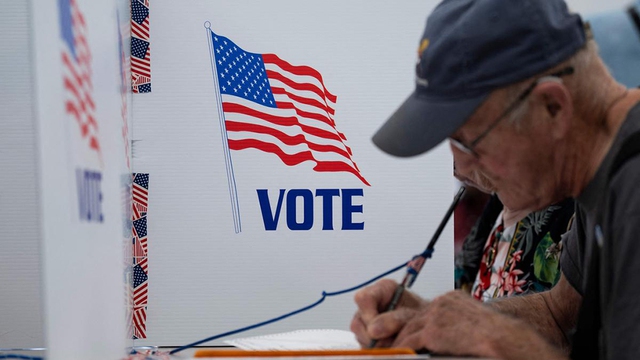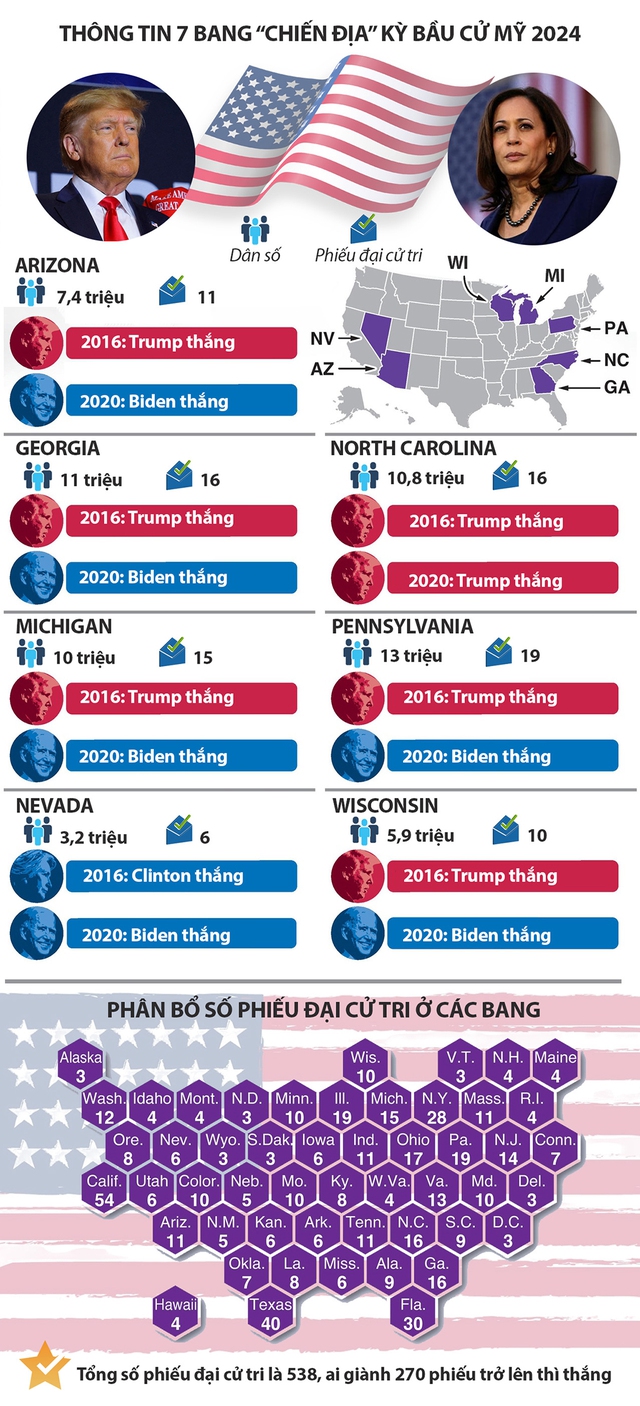According to developments so far, the voting results in 7 "battleground" states of the US are also expected to decide who will be the overall winner in the race to the White House this year, amid many concerns about disputed results after the election.
Early voting has begun in many states since September, but of course the final results will have to wait until after November 5, the official election day this year. Currently, analysts are monitoring the situation in 7 "battleground" states: Arizona, Georgia, Michigan, Nevada, North Carolina, Pennsylvania and Wisconsin. These are states with high levels of volatility, not traditionally "loyal" to Republican or Democratic candidates like many other states.
The Wall Street Journal cited the results of the latest poll, with the participation of 4,200 voters in the above 7 states, showing that former US President Donald Trump is considered to be more capable than his opponent, current Vice President Kamala Harris, in solving the issues that people are most concerned about: the economy and border security.
Fierce competition
However, the poll results divided the expectation of victory for both candidates, with Mr. Trump leading with 46% support, while his opponent Harris had 45% support. The difference of 1 percentage point is smaller than the allowable margin of error.
Americans vote early in Minnesota in late September
Photo: AFP
State by state, the poll shows Harris with a slim lead in Arizona, Michigan, Wisconsin and Georgia, while Trump has a small advantage in Nevada, North Carolina and Pennsylvania. Except for Nevada, where Trump has a 5 percentage point advantage, the poll finds the other candidates leading by only 2 to 3 percentage points. This difference is within the margin of error.
Also through the latest survey in these states, which are usually highly volatile regardless of party, but after the Democratic Party changed candidates and Mr. Trump experienced two assassination attempts, voters are tending to return to support their party's candidate. Both Mr. Trump and Ms. Harris received the support of 93% of voters from each party (Republican or Democratic) participating in the survey. As for independent voters, the poll results showed that 40% supported Ms. Harris, while Mr. Trump received a rate of 39%.
When it comes to the current state of the economy, voters surveyed differ on the state of the U.S. economy overall and that of their home states. Nearly two-thirds of voters said the U.S. economy is “poor or not good.” But when asked about the economy in their home state, a majority of 52 percent rated it as good or excellent.
Risk of disputed results
From the above results, many opinions say that the possibility is high that the result of this year's US presidential election will depend on a small number of voters, most likely concentrated in about 6% who are wavering and have not yet made a choice. In other words, the winning candidate may not create much of a gap compared to his opponent in the voting results in the 7 "battleground" states.
Graphics: Hoang Dinh
Meanwhile, the issue of how to count mail-in ballots could be a major controversy. According to The New York Times , mail-in ballots are increasingly popular in US elections, but they are rejected much more often than in-person ballots. In Pennsylvania and several other states, the two parties are arguing over which ballots are valid and which are not. Specifically, which ballots are allowed to be corrected or which ballots are so flawed that they should not be counted. It seems simple, but the legal interpretation is said to be open to many different interpretations, which can easily lead to heated debate.
In the 2020 US presidential election, Pennsylvania election officials rejected more than 34,000 mail-in ballots, or 20,000 rejected ballots in Michigan, 7,700 rejected ballots in Arizona, 5,600 rejected ballots in Nevada, and about 3,000 were not counted in Wisconsin.
While these numbers are much smaller than the millions of voters, candidates often win by a small margin. In the 2020 election, for example, Joe Biden only won by 10,000 votes over Donald Trump in Arizona, 12,000 in Georgia, and 21,000 in Wisconsin. Similarly, in 2016, Trump only won by a narrow margin over Hillary Clinton in Michigan, 11,000 votes over Wisconsin, and 23,000 in Wisconsin.
This year, when the final result is believed to depend on a small number of undecided voters, leading to a small margin of victory or defeat, "counting the votes correctly and completely" becomes even more important. Not only that, America is deeply divided, so if the controversy over the election results recurs, it could cause serious consequences.
Trump announces anti-immigrant campaign
Former President Trump on October 11 continued to make tough statements about his commitment to fight against immigrants if elected. As an opponent of illegal immigration, Mr. Trump considers the massive migration to the US as an "invasion". In a speech in Aurora, Colorado, Mr. Trump announced "Operation Aurora" to fight against immigrants, according to The Guardian on October 11. The former president also announced that he would propose a bill to ban all "sanctuary cities" - a term referring to areas with policies to protect undocumented immigrants. Mr. Trump has repeatedly vowed to carry out the largest deportation in US history if he returns to the White House. On the same day, October 11, Vice President Harris held a campaign event in Scottsdale, Arizona. Writing on social network X, Ms. Harris emphasized that if re-elected, she will fix the problematic immigration system. "This includes securing our borders and providing a humane way for hardworking people to gain citizenship. I reject the false idea that we cannot do both," she said.Thanhnien.vn
Source: https://thanhnien.vn/dau-truong-sinh-tu-trong-cuoc-bau-cu-tong-thong-my-185241012221918079.htm




































































































Comment (0)